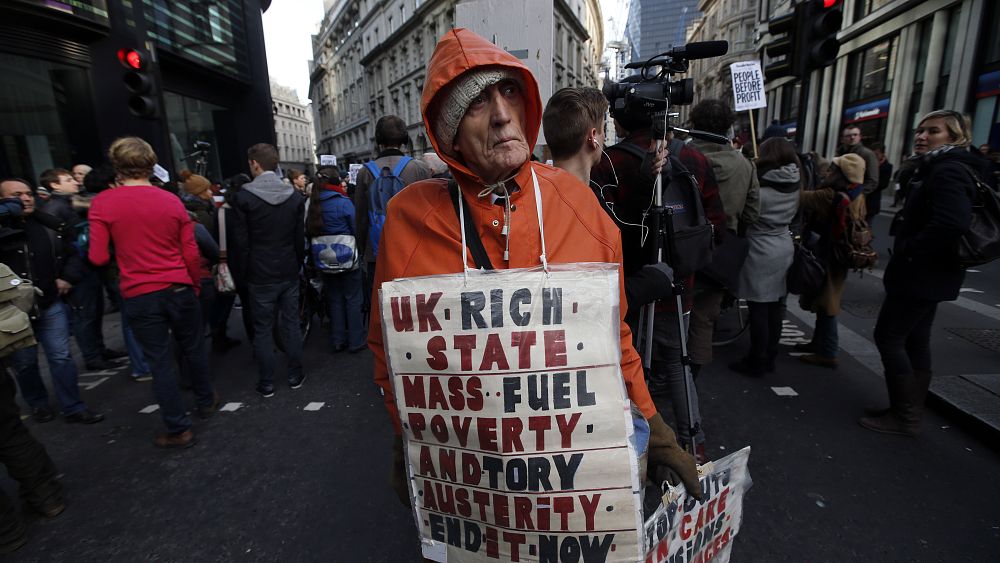
Charities have warned that hundreds of thousands of people in the UK could have to choose between feeding their families and paying their energy bills as the government raises the energy price cap.
Britain’s energy regulator is increasing the price cap for 15 million customers who do not have a fixed price contract.
The increases will be between £139 (€160) to £153 (€178), the regulator said, depending on contracts and the method of payment.
“This increase is driven by a rise of over 50% in energy costs over the last six months with gas prices hitting a record high as the world emerges from lockdown,” the UK regulator said in August.
The increased price cap is likely to send an estimated 488,000 people into “fuel poverty”, the End Fuel Poverty Campaign has said, for a total of 4.1 million households.
They estimated that another price cap hike in the spring could bring the number of households in fuel poverty to 5.2 million or 22.26% of England’s households, according to an analysis also released on Friday.
Rising prices to hit families hard
Gas prices are rising globally due to higher demand as many countries exit COVID-19 lockdowns.
The UK regulator has encouraged people to “shop around” for a better deal from suppliers while acknowledging that the change could impact families hit hard by the pandemic.
But activists say that’s an unrealistic request for families that may not have access to computers or have the time to compare prices.
“People on low incomes are often not in a position to do the regular kind of shopping around online and chasing the better deals, that better-off people can do.
“You may be working two jobs already and have children. You may not have Internet access,” said Ruth London at campaign group Fuel Poverty Action.
“The whole solution that the government has been putting forward … was switch to a better, cheaper supplier.
“And now that’s been shown to be the really fake solution that it always was because the companies that people have switched to because they were offering much better deals have gone bust.”
Several small UK gas companies stopped trading recently, facing pressure due to rising prices.
UK business secretary Kwasi Kwarteng said two weeks ago that consumers’ “gas and electricity supply will continue uninterrupted if a supplier fails.”
Kwarteng said the UK was not dependent on Russia for oil and gas but rather the sources were domestic or from “reliable suppliers such as Norway”.
The price cap increase, however, could hit families hard as it comes at the same time that the UK government is ending several programmes meant to help people impacted by the pandemic, including a furlough scheme and £20 universal credit.
The UK announced on Thursday a support scheme of £500 million (€581.5 million) to help vulnerable households.
Simon Francis, co-ordinator of the End Fuel Poverty Coalition said that while the newly announced funding could “provide some short-term relief” for families, it was no substitute for a plan to end the fuel poverty crisis and improve the energy efficiency of homes.
He called it a “panic response to negative headlines” that was a “drop in the ocean compared to what is needed.”
What’s behind the energy crisis?
A number of factors have contributed to an aggravated crisis in the UK and Europe that will be felt by consumers over the next few months, experts say.
These include a combination of factors such as a lack of maintenance during COVID-19 lockdowns and the current global economic rebound. A colder winter in Europe also meant that people were heating their houses until the middle of May, which increased demand.
There is also “a lot of competition going on between European buyers and Asian buyers for (natural gas),” said Simone Tagliapietra a senior fellow at Brussels-based think tank Bruegel, who specified that in the UK, delays to nuclear power maintenance influenced electricity production as well.
He called the crisis in Europe and the UK “a perfect storm made of very different elements.”
“You need to consider that in the UK, gas is a very important tool in the electricity generation system and therefore this is having a huge impact on the electricity bill way more than in Europe,” Tagliapietra said.
Experts have also pointed to less wind power as a contributing factor this year to the higher demand for natural gas.
Many say that a slow transition to renewable energy is also responsible, questioning why consumers are paying for a volatile fossil fuel energy system.
“The rise in energy prices that we’re seeing is the start of a much bigger and more structural issue that we’re going to see happening time and time again whilst we still rely on fossil fuel dominant energy system,” said Martha Myers at non-profit organisation Friends of the Earth Europe.
“It’s a very short-sighted argument that because of our gas price increase that we’re seeing at the moment, that the solution is more gas. For me, it’s kind of like getting a pothole on the road and thinking that we should make another pothole,” she said.
